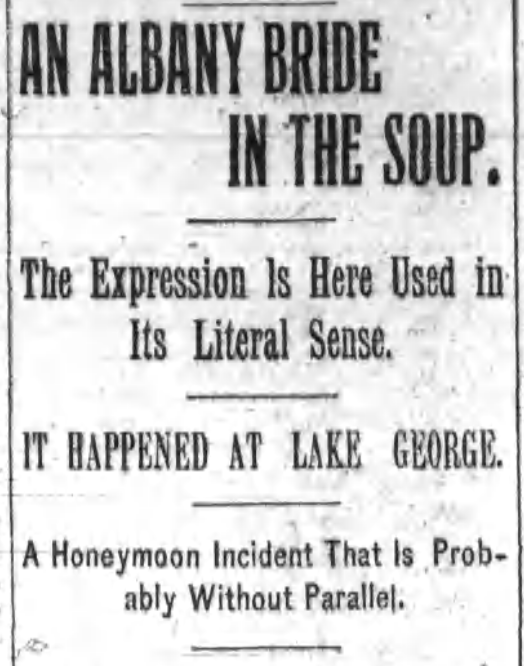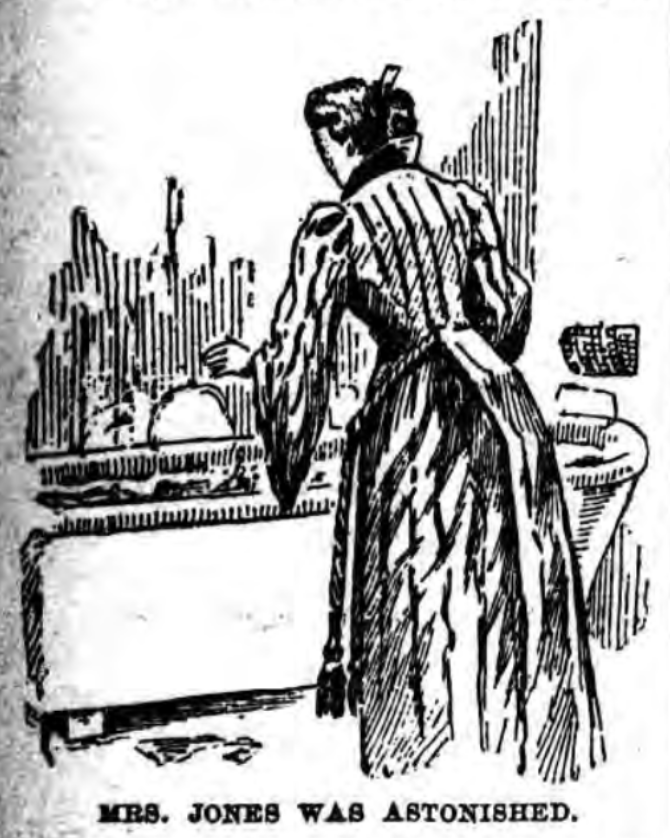
We present this particular story in the spirit of Ripley’s “Believe It or Not,” at least in this sense: This appeared in the Albany Morning Express on July 22, 1895, and you may choose to believe it, or not.
The headline was “An Albany Bride in the Soup. / The Expression Is Here Used in Its Literal Sense. / It Happened at Lake George. / A Honeymoon Incident That Is Probably Without Parallel.”
The article assigned a newlywed couple the name of Jones – “it’s a good enough name when a sense of delicacy dictates not to disclose the real name. There could probably not be found in the entire history of New York state another bride of only four hours who so completely got ‘in the soup’ as did this one.” The Express then relates a story told by a Lake George correspondent of the New York Press of a couple from Albany honeymooning in Lake George, and the bride who wished for a bath after dusty rail travel.
“This particular hotel at which the couple are staying has all the joys of life, but none of the modern conveniences. If you want a cold bath that is easy enough. But a hot bath is laboriously prepared by the bellboy carrying pitchers of water from the kitchen boiler.” A nice reminder that hot running water was not always available even in the most luxurious of locations.
“It happens that the cooking range is the only bit of modern ingenuity in the house. The chef is a past grand master in the science of soup . . . In order to pursue his investigation into the causes and effects of soup he had a range specially constructed with a double boiler, one side of which holds gallons of his famous gastronomic fluid, while the other contains hot water to keep it at an even temperature. You must diligently study this matter in order to comprehend what follows.

“In due time the bellboy sleepily prepared the hot bath, and Mrs. James Jones, coyly escaping from her newly made husband, entered the bathroom . . . the lady was astonished and perplexed by the extraordinary water in the bathtub. It was greasy, it had an appetizing odor, and by the dim light of a candle she thought that she discovered vegetables in it.
“’Pshaw!’ she said to herself, ‘there are mineral springs here, and undoubtedly this is supplied by one of them. Very likely this rich and odorous water will give me even greater beauty than I now possess. Yet I fancy that I smell onions, discover leeks, apprehend garlic and am titillated by Worcestershire sauce. But that is imagination. I am newly married, scarce four hours ago, and it is my wifely duty to be as lovely as possible.’ Whereupon she made a lather on the sponge, and after much difficulty effected her ablutions.”
Did the writer take some liberties? No doubt. His flair for drama and love of the question as exposition is on full display:
“Sir, is it necessary to go further? May not we better end this extraordinary history at the present point? Or shall we inquire into the matter and discover the chef next morning in a state bordering on insanity, his soup boiler empty, his customers disappointed, his reputation imperiled? Shall we witness him first cross-examining, then thrashing the unhappy bellboy? Shall we follow the landlord as he explains to his guests that they cannot have their usual soup at dinner? Shall we overhear the curious remarks made by the bride as she discusses with ladies on the piazza the remarkable mineral qualities of the water? Shall we relate that her natural sweetness was interfered with all day by the perfume of onions and garlic, and that she combed various vegetables out of her silken tresses? Shall we consider the confusion of the husband? Shall we offer any comment on the wholly unusual beginning of a honeymoon that promises to end happily?
“No, sir. These matters must be left to the imagination. The blundering bellboy has been dismissed, the chef has put a spring lock on his soup boiler, and the blushing bride has fled the scene in embarrassment to take a Turkish bath. This is a story no less true than remarkable, and out of respect to the lady I shall give no further particulars of it to any body.”

Leave a Reply